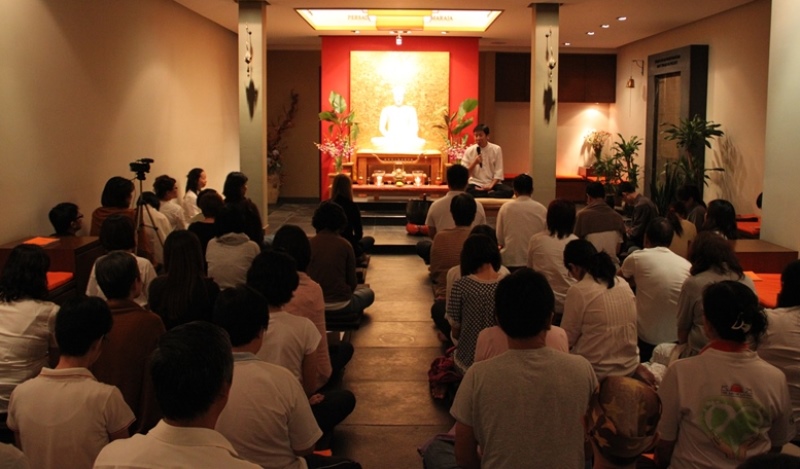“A Good Practitioner & A Good Friend”
“A Good Practitioner & A Good Friend”
The following is a summary of Bro. Tan’s teaching on 26 June, the third group meditation in conjunction with the Gimhana Retreat held at Nalanda Centre.
Bro. Tan started by quoting a Sutta from the Anguttara Nikaya (AN 4.101), where the Buddha gave a discourse on the four kinds of clouds, comparable to four kinds of persons :-
• The cloud that thunders, but does not rain; someone who is a talker, but not a doer.
• The cloud that rains, but does not thunder; someone who is a doer, but not a talker.
• The cloud that neither thunders nor rains; someone who is neither a talker nor a doer.
• The cloud that both thunders and rains; someone who is both a talker and a doer.
Many Buddhists talk about the Dhamma, but fail to practise what they discussed. There are some who do practise it, but only for their own welfare and not for the welfare of others, neither talking about practice nor sharing it with others. The majority of people in the world fall into the third category, as very few actually speak about, and practise, the Dhamma! Rare is the fourth type of person – one who has mastered the Dhamma and inspires others to learn and practise as well.
Bro. Tan went on to quote the next discourse (AN 4.103) on (storage) pots. The Buddha said, “Bhikkhus, there are these four kinds of pots. What four?
• The one that is empty and covered;
• The one that is empty and open;
• The one that is full and open;
• The one that is full and covered.”
One who is ‘full’ has a higher appreciation and realisation of the Dhamma, while one who is ‘empty’ does not. One who is ‘covered’ inspires confidence in others through his behaviour and mannerisms, while one who is ‘open’ does not. There are those who are realised and yet do not display it in their behaviour; while there are also others who are not realised yet able to behave in an inspiring manner. The best is one who is highly-realised and inspires through his genuine behaviour.
In learning Dhamma, Bro. Tan advised that it is important to investigate and penetrate the teachings deeply, and not just ‘knowing’ them superficially. There are five strengths (AN 5.1) that practitioners ought to train ourselves to progress spiritually, namely:
• ‘Saddha’ – faith in the Enlightenment of the Buddha and His sublime qualities.
• ‘Hiri’ – moral shame of bodily, verbal and mental misconduct, and shame of acquiring
unwholesome qualities.
• ‘Ottappa’ – moral dread of any bodily, verbal and mental wrongdoing, and dread of acquiring
and retaining unwholesome qualities.
• ‘Viriya’ – energy and earnest effort in abandoning unwholesome qualities and acquiring
wholesome qualities.
• ‘Pañña’ – wisdom to discern between what is wholesome and what is unwholesome.
Among these five, the strength of wisdom is foremost, as it holds all the others in place and unifies them. It is wisdom that enables us to clearly distinguish wholesome from the unwholesome, the appropriate situation for moral shame and dread, and where we should place our faith. These five strengths fuel our spiritual training, and in turn inspire others in their training. As such, one is said to be practising for the welfare of oneself, as well as for the welfare of others.
When one practises well and lives by the Dhamma, one is a ‘good practitioner’. When one inspires others to practise, then one is a ‘good friend’. Bro. Tan concluded with this advice: “Be a good practitioner, and be a good friend!”


